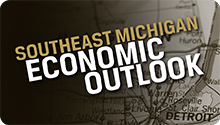
This April 28 article on DBusiness Daily News reports on Oakland University’s Southeastern Michigan Economic Outlook April 2014 Policy Forum report including an interview with OU Economics Professor Jonathan Silberman.
 Read the full here
Read the full here
An excerpt is below.
The adverse economic impact of raising Michigan’s minimum wage to $10 from $7.40 per hour outweighs the benefits, say a majority of economic experts and business executives who participated in a recent policy forum through Oakland University’s School of Business Administration in Rochester Hills.
In contrast, the majority of consumers participating in the survey say they believe the benefits the increase would bring to low-skilled workers are greater than the costs, which may include lost jobs, higher prices, or less profits for business.
“As far as the consumers are concerned, I think that they may be not as aware of the long-term economic effect (of increasing the minimum wage),” says Jonathan Silberman, professor of economics at Oakland University. “Business executives, of course, would be very aware of the potential costs and how it will impact their business.”
Silberman says business experts and executives cited concern with the impact the minimum wage would have on employment. “They’re concerned that employers may substitute capital for labor. For example, if you go to a restaurant you may place your order using an iPad on the table, (meaning) the business won’t need as much staff,” he says.
This April 28 article on DBusiness Daily News reports on Oakland University’s Southeastern Michigan Economic Outlook April 2014 Policy Forum report including an interview with OU Economics Professor Jonathan Silberman.
Read the full here